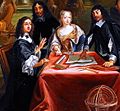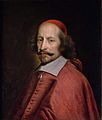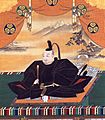17th century facts for kids
| Millennium: | 2nd millennium |
|---|---|
| Centuries: | 16th century · 17th century · 18th century |
| Decades: | 1600s 1610s 1620s 1630s 1640s 1650s 1660s 1670s 1680s 1690s |
| Categories: | Births – Deaths Establishments – Disestablishments |
The 17th century was a period from 1601 to 1700. It was a time of huge changes around the world. People saw new ideas in science, big wars, and powerful empires growing. This century helped shape the modern world we live in today.
Contents
A Time of Big Changes
The 17th century was a period of major shifts. Many countries saw their rulers become more powerful. New ways of thinking about science and philosophy also emerged. It was a time when the world started to connect more through trade and exploration.
New Ideas in Science
This century was a golden age for science. Scientists started using observation and experiments. This was a new way to understand the world.
- Galileo Galilei used a telescope to study the sky. He showed that Earth orbits the Sun.
- Isaac Newton discovered the laws of gravity. He also developed new ideas about motion.
- René Descartes was a famous philosopher and mathematician. He focused on reason and logic. His ideas influenced many thinkers.
These discoveries changed how people viewed the universe. They laid the groundwork for modern science.
Powerful Rulers and Empires
Many countries were led by very strong rulers. These leaders often had absolute power.
- In France, King Louis XIV was known as the "Sun King." He built the grand Palace of Versailles. He made France a very powerful nation in Europe.
- The Mughal Empire in India was at its peak. Emperor Aurangzeb ruled over a vast area. This empire was rich and culturally diverse.
- In Japan, Tokugawa Ieyasu founded the Tokugawa shogunate. This government brought a long period of peace. Japan became mostly isolated from the rest of the world.
- The Dutch Republic became a major trading power. The Dutch East India Company was very strong. They explored and traded across the globe. Jan Pieterszoon Coen was a key figure in their expansion.
These empires shaped the political map of the world. They also led to many conflicts.
Major Wars and Conflicts
The 17th century saw some very destructive wars. These conflicts changed borders and power balances.
- The Thirty Years' War (1618–1648) was one of the longest wars. It involved many European countries. It caused a lot of destruction, especially in Germany. Albrecht von Wallenstein was a famous general in this war.
- The English Civil War (1642–1651) was a fight within England. It was between the King and Parliament. It led to a temporary republic.
These wars had a huge impact on people's lives. They also led to new ideas about government.
Art and Culture Flourish
Art and culture also thrived in the 17th century. This period is often called the Baroque era.
- Artists like Rembrandt van Rijn created amazing paintings. His work, like The Night Watch, is still famous today.
- Music became more complex and expressive. Composers wrote grand operas and oratorios.
- Literature also saw great works. Playwrights like William Shakespeare (early 17th century) and Molière created timeless plays.
This rich cultural output reflects the spirit of the age. It shows a time of both grandeur and deep thought.
Images for kids
-
The Night Watch or The Militia Company of Captain Frans Banning Cocq, 1642. Oil on canvas; on display at the Rijksmuseum, Amsterdam
-
Catholic general Albrecht von Wallenstein (1583–1634), supreme commander of the armies of the Imperial Army during the Thirty Years War
-
Jan Pieterszoon Coen (1587–1629), the founder of Batavia, was an officer of the Dutch East India Company (VOC), holding two terms as its Governor-General of the Dutch East Indies
-
René Descartes (1596–1650) with Queen Christina of Sweden (1626–1689)
-
Cardinal Mazarin (1602–1661), who served as the chief minister to the kings of France Louis XIII and Louis XIV
-
Mughal Emperor Aurangzeb (1618–1707), who ruled over almost the entire Indian subcontinent for a period of 49 years
-
Shōgun Tokugawa Ieyasu was the founder of Japan's final shogunate, which lasted well into the 19th century
See also
 In Spanish: Siglo XVII para niños
In Spanish: Siglo XVII para niños
 | Ernest Everett Just |
 | Mary Jackson |
 | Emmett Chappelle |
 | Marie Maynard Daly |








